Key takeaways:
- Understanding dyslexia requires a shift in focus from challenges to strengths, promoting empathy and tailored support for learners.
- School meetings foster collaboration between parents and educators, empowering effective advocacy for students with dyslexia.
- Preparation, including gathering evidence and creating agendas, enhances communication and engagement during school meetings.
- Personal stories and experiences can build connections, drive empathy, and inspire collective action for necessary resources and support.
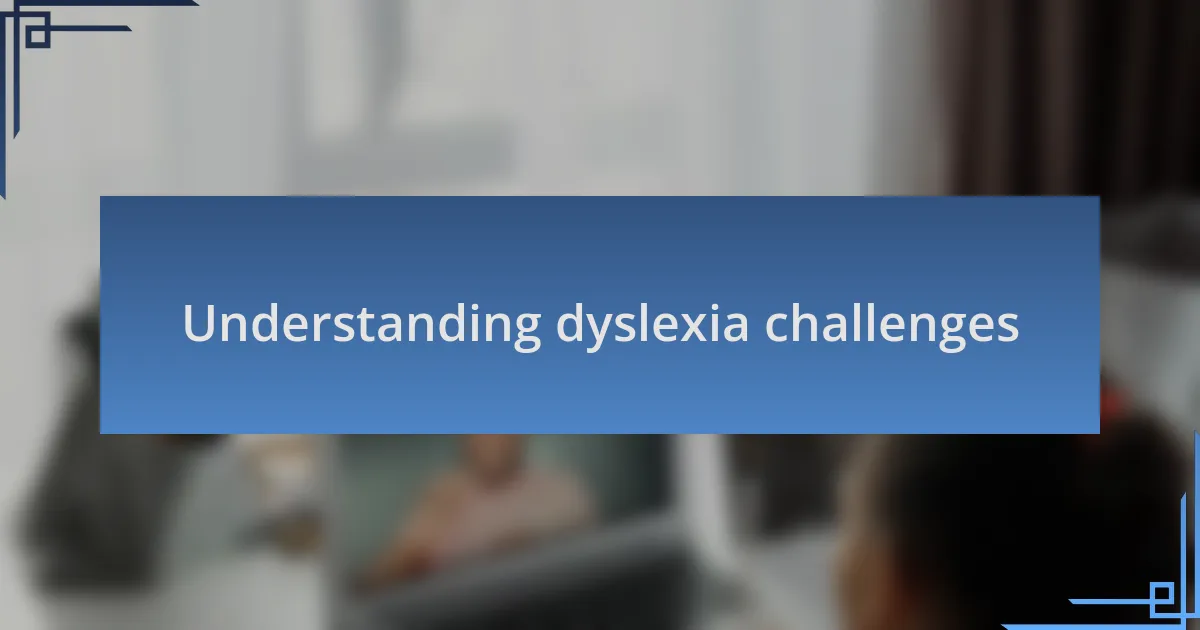
Understanding dyslexia challenges
Understanding dyslexia challenges is a complex journey that often feels isolating for both students and their families. I remember when a teacher suggested that my child struggled to keep up, not because of a lack of effort, but due to how dyslexia affected their reading speed and comprehension. It really hit home, raising the question: How can we truly measure progress when conventional metrics don’t capture the full picture of a learner’s potential?
Navigating school can be particularly daunting for students with dyslexia, especially during high-pressure situations like exams or presentations. I once watched my child freeze during a class reading assignment, overwhelmed by the task and the fear of making mistakes. It made me wonder if the academic environment can be more accommodating and sensitive to the unique needs of these learners.
Many parents feel a rollercoaster of emotions as they advocate for their children. I found myself oscillating between hope and frustration, seeking resources while grappling with the misconception that dyslexia is merely an issue of intelligence. Isn’t it time we shift the conversation to focus on strengths rather than just challenges? In doing so, we can foster a richer understanding of dyslexia that celebrates each student’s individual journey.
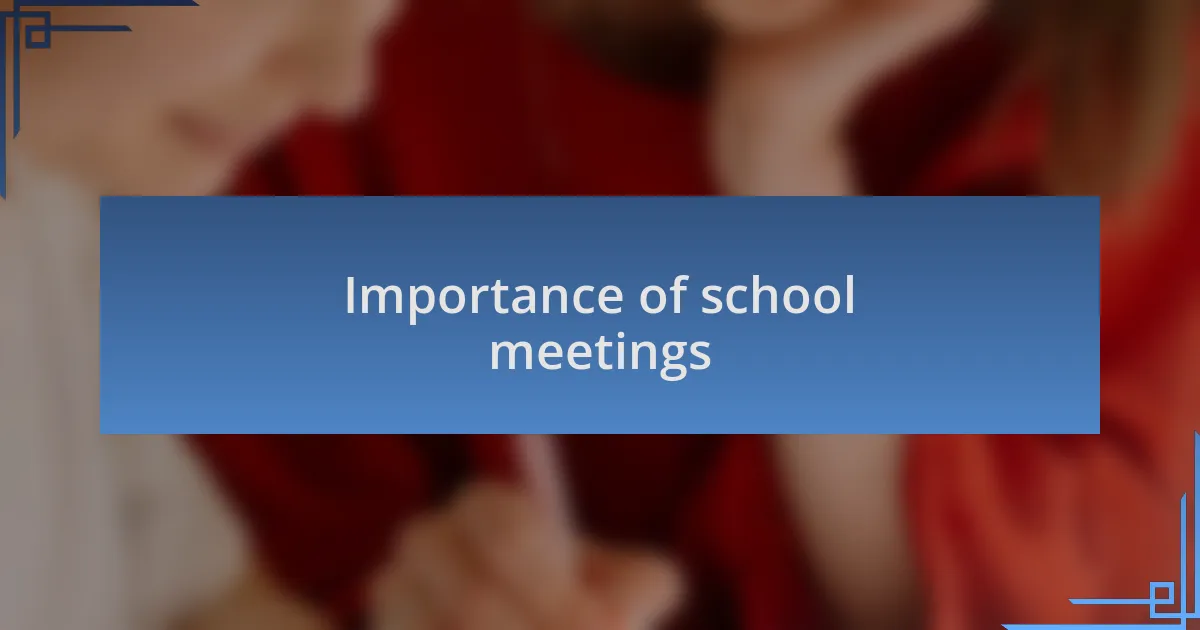
Importance of school meetings
School meetings play a crucial role in bridging the gap between parents, educators, and students, especially for those navigating the complexities of dyslexia. I remember attending a meeting where we discussed my child’s specific learning needs. The dialogue not only informed my understanding but also empowered me to advocate more effectively for accommodations.
These gatherings provide an invaluable platform for sharing insights and experiences. When parents and teachers come together to discuss a child’s learning journey, it fosters a collaborative spirit. I recall one particular session where hearing the teacher’s perspective on my child’s strengths shifted my focus. It made me question: how often do we miss out on this collaboration, inadvertently isolating our children from the support they truly need?
Moreover, school meetings allow for a unified approach to addressing challenges. I felt a sense of relief when we brainstormed strategies together, realizing that solutions often lie in collective brainstorming. It made me ponder whether these meetings could be a primary tool for cultivating understanding and empathy among all stakeholders in a child’s education, paving the way for success.
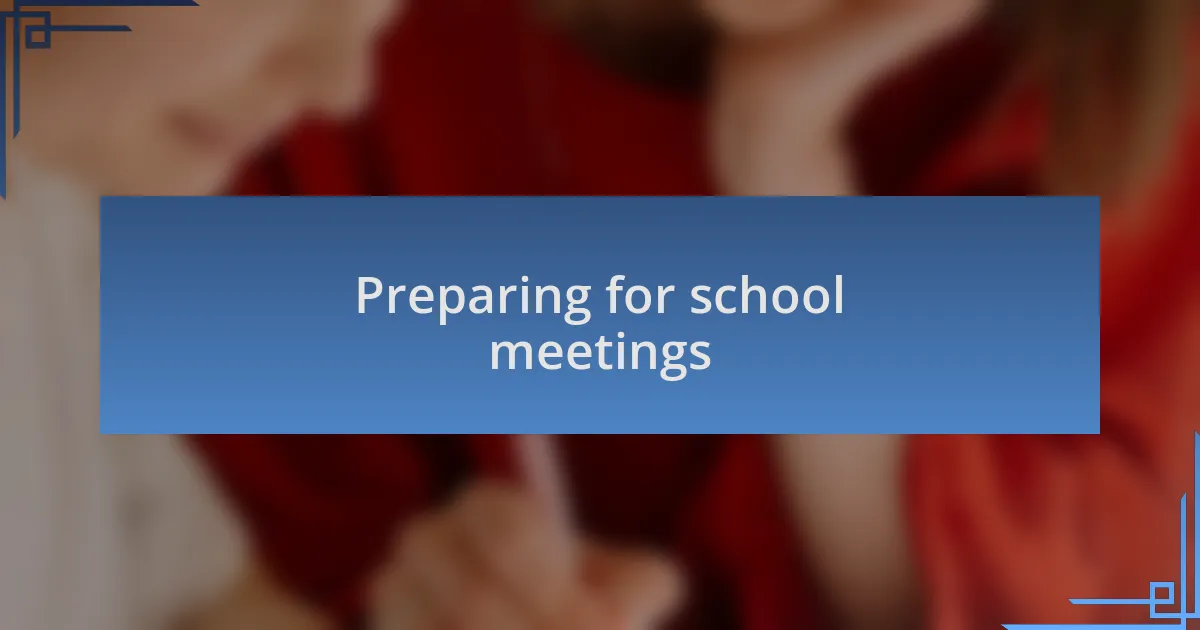
Preparing for school meetings
When preparing for school meetings, I found that gathering all relevant information about my child’s progress and challenges was essential. I took time to compile samples of my child’s work and any notes from previous meetings. It was surprising how having tangible evidence boosted my confidence and made it easier to engage in discussions. Have you ever experienced that moment when you realize you have the power to influence the conversation?
Creating an agenda also helped me stay focused during the meeting. I made a list of topics I wanted to cover, prioritizing the most pressing concerns first. In one memorable meeting, touching on my child’s social interactions, I noticed the educators were more than willing to dive deep into the subject. Isn’t it interesting how setting clear intentions can shape the flow of dialogue?
Lastly, I always made an effort to bring along a supportive friend or family member. Their perspective often highlighted points I might have overlooked, bringing a new layer of understanding. I remember a time when my friend asked a question I hadn’t even considered, which led to a crucial insight about available resources. Have you ever thought about how having an extra set of ears could open doors to opportunities you might miss on your own?
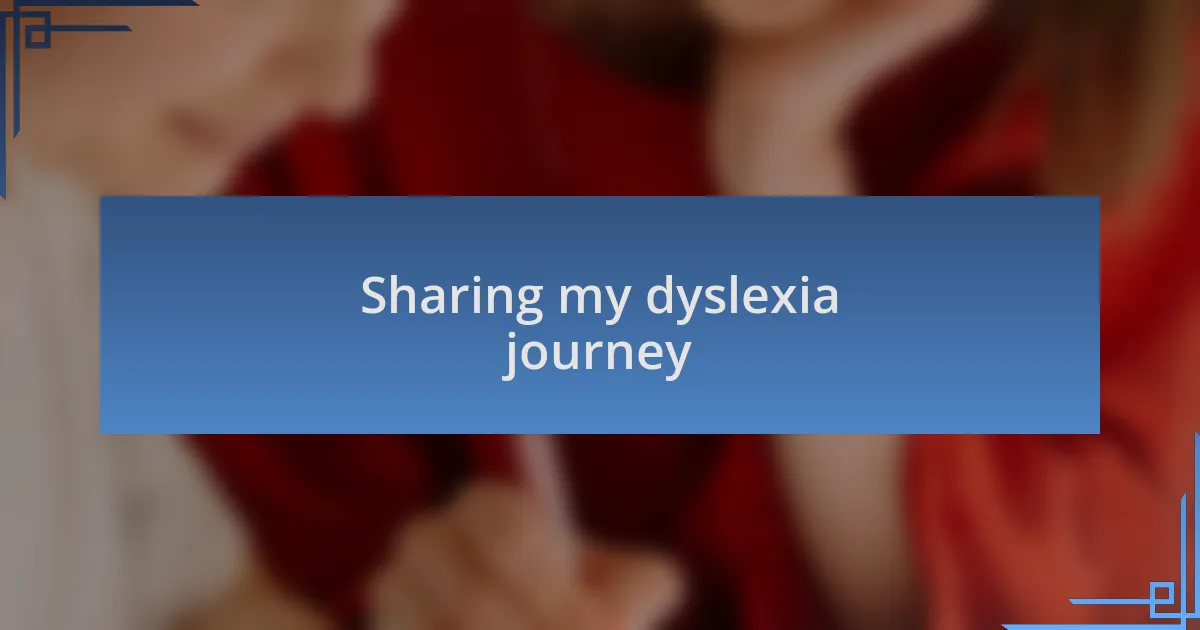
Sharing my dyslexia journey
Navigating my dyslexia journey has been both challenging and enlightening. I vividly recall the emotions that washed over me when I first realized that my reading struggles were part of a bigger picture. I remember feeling frustrated yet determined, as I wanted to prove to myself that I could overcome these hurdles. Have you ever felt that blend of fear and resolve when facing an obstacle?
Sharing my experiences with dyslexia has transformed how I connect with others. Opening up about my struggles often invites supportive conversations, leading to unexpected advice and resources. One time, during a casual chat with another parent, I learned about an incredible tutor who specialized in dyslexia support. It was a reminder that sometimes, the support we need is just a conversation away—don’t you think that sharing our stories can lead to powerful connections?
Reflecting on my dyslexia journey, I have come to realize the importance of self-advocacy. I sat in meetings where I initially felt intimidated, but over time, I learned to articulate my child’s needs. I remember one particularly empowering moment when I firmly expressed our requirements for additional learning tools. Have you ever experienced the rush of confidence that comes when you stand up for what you believe is right? It made me realize how vital it is to be the voice for ourselves and our loved ones.
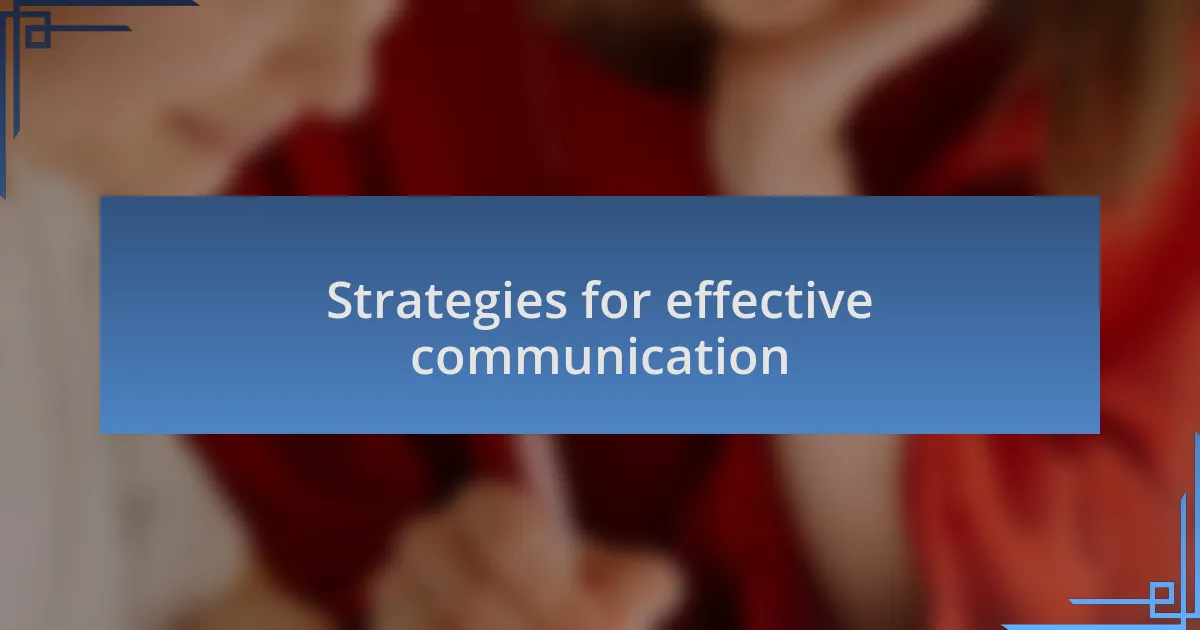
Strategies for effective communication
Effective communication during school meetings is essential, especially when discussing the intricacies of dyslexia. I’ve found that preparing a clear agenda before the meeting helps you stay focused and organized. One time, I brought a list of specific concerns about my child’s reading progress, which guided the conversation and allowed others to understand my perspective. Isn’t it easier to speak up when you know exactly what you want to address?
Establishing rapport with educators and support staff is another key strategy. I recall a moment when I made an effort to introduce myself to the school psychologist before a meeting. We shared a few light-hearted exchanges, which made the atmosphere more comfortable and collaborative. Have you noticed how a simple smile or shared story can make communication flow more easily? Building these connections fosters an environment where everyone feels valued.
Lastly, active listening plays a crucial role in effective communication. During one meeting, I focused intently on the teacher’s feedback instead of just preparing my response. I was surprised by how much I learned by truly hearing their insights. Don’t you think that listening can open doors to understanding different viewpoints? By ensuring that everyone feels heard, we establish a partnership that can significantly benefit our children’s educational experience.
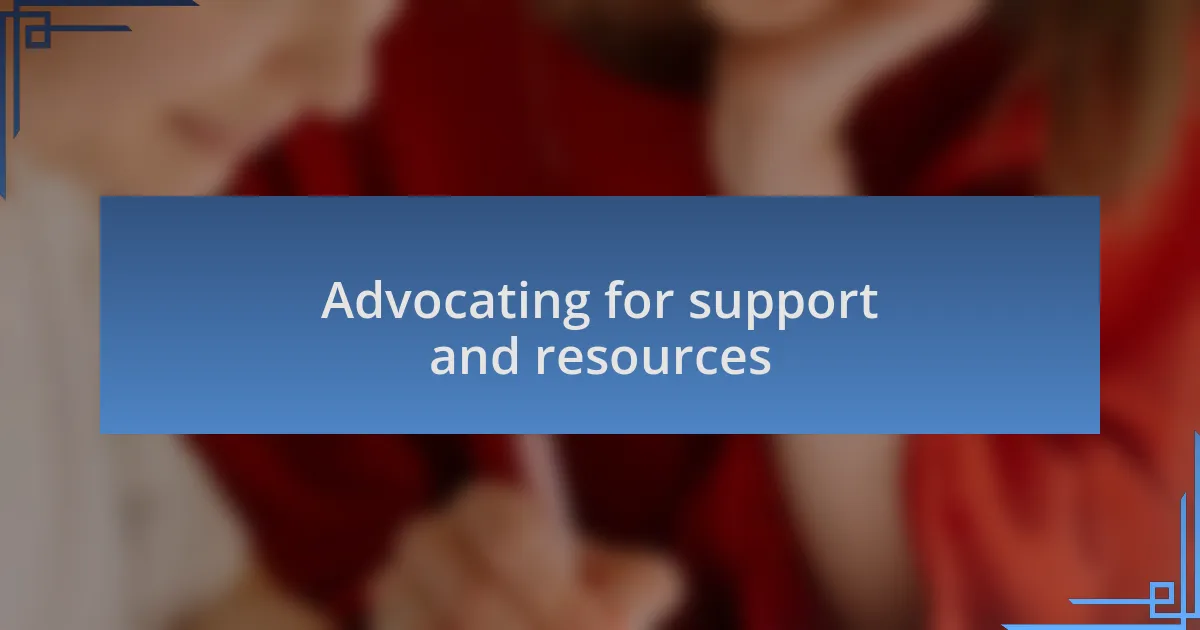
Advocating for support and resources
Advocating for support and resources can feel daunting, but it’s crucial. I remember the first time I walked into a school meeting feeling overwhelmed. I realized that bringing a research-backed list of resources not only bolstered my argument but also empowered me. Have you ever felt that surge of confidence when you know you’re armed with information?
When I spoke about the need for specialized tutoring programs, I made sure to highlight success stories of kids who thrived with additional support. That shift in focus made the educators more receptive to the idea. Isn’t it compelling when you can illustrate the potential benefits through real-life examples? It creates a narrative that resonates with everyone at the table, changing the conversation from “if” to “how”.
Furthermore, expressing my child’s personal experiences with dyslexia made the discussions more relatable. I shared how my child struggled to read aloud in class, feeling anxious and isolated. The transformation in the room was palpable; it turned from a formal meeting into a shared mission to find solutions. Have you noticed how sharing heartfelt stories can spark empathy and drive a collective effort for change? This connection can inspire educators to seek out and advocate for the resources our children truly need.
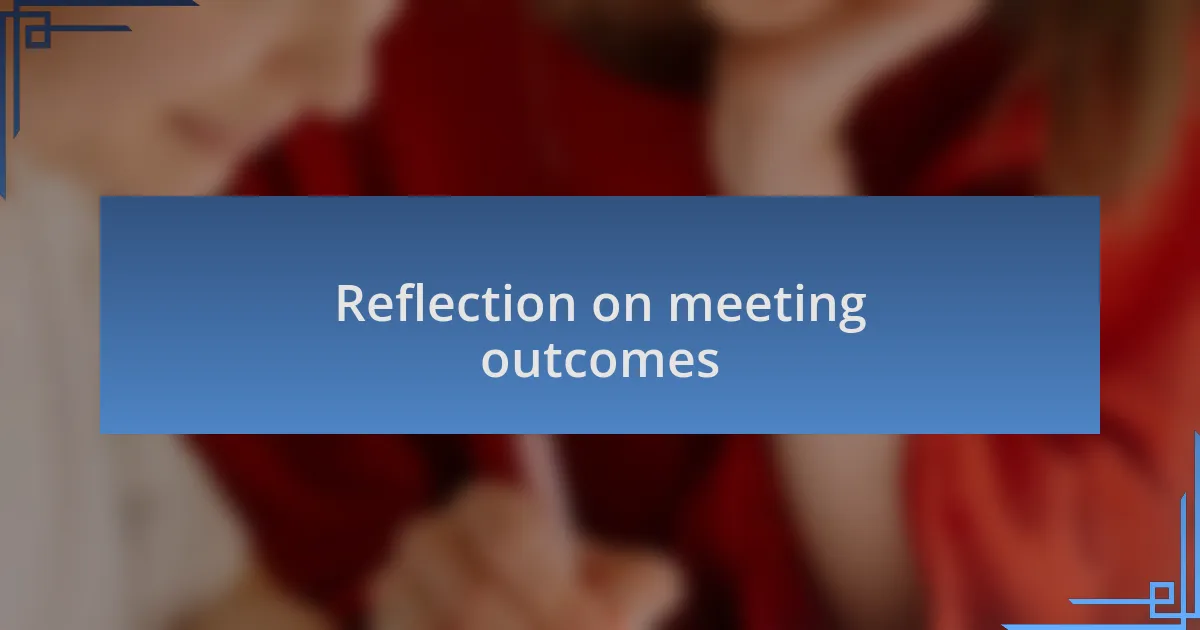
Reflection on meeting outcomes
Reflecting on the outcomes of school meetings, I often find myself evaluating what went well and what could have been improved. After one particular meeting, I felt a sense of accomplishment, especially when several educators expressed a willingness to explore new strategies. It made me realize that sometimes, just planting the seed of a new idea can lead to unexpected growth.
In another instance, I left a meeting feeling frustrated because my suggestions seemed to fall flat. I vividly remember the moment when I proposed additional accommodations for my child, only to be met with hesitance. This experience taught me the importance of persistence; sometimes, the most significant breakthroughs take multiple conversations before they really sink in. Have you ever left a meeting questioning what could have been done differently?
Looking back, I appreciate the moments of connection that emerged from these discussions. There was a meeting where, after sharing a poignant story about my child’s struggles with homework, I noticed a few heads nodding in understanding. That shared vulnerability shifted the atmosphere, reaffirming that our experiences can ignite a conversation about change. It makes me wonder: how often do we overlook the power of personal narratives in driving impactful outcomes?